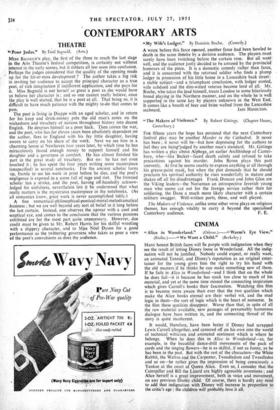'CONTEMPORARY ARTS
THEATRE
44 Poor Judas." By Enid Bagnold. (Arts.) MISS BAGNOLD'S play, the first of the three to reach the last stage in the Arts Theatre's festival competition, is certainly not without interest in the early scenes, but it slithers all too soon into confusion. Perhaps the judges considered that the quality of the opening made up for the hit-or-miss development ? The author takes a big risk in inviting her audience to accept the principal character as a true poet, of rich imagination if indifferent application, and she pays for it. Miss Bagnold is not herself as great a poet as she would have us believe her character is ; and so one cannot really believe, once the play is well started, that he is a poet at all. That being so, it is difficult to have much patience with the mighty to-do that comes to pass. The poet is living in Dieppe with an aged scholar, and in return for his keep and drink-money puts the old man's notes on the wickedness and treachery of nations throughout history into decent English. He despises himself as a poor hack. Then comes the war, and the poet, who has for eleven years been absolutely dependent on the author, flees to England with his fey little daughter, having sworn to carry on his share of the wok. Next we see him in a charming house at Newhaven four years later, by which time he has miraculously found enough money to support himself and his daughter and a governess in comfort. He has almost finished his part in the great study of treachery. But no : he has not even touched it ; he has spent the four years writing some masterpiece (unspecified) in several notebooks. For the ancient scholar turns up, frantic to see his work in print before he dies, and the poet's negligence is exposed in a scene full of rage and riot. The frenzied scholar has a stroke, and the poet, having off-handedly acknow- ledged his sinfulness, nevertheless lets it be understood that what really matters is the mysterious masterpiece in the notebooks. (As all romantics know, great work is never accomplished tidily.) A fine romantical-philosophical-poetical-moral-melodramatical .business ; but we are well beyond any sort of belief in it long before the last curtain. Instead, one observes the uproar with a cool and sceptical eye, and comes to the conclusion that the various passions exhibited are for the most part quite unnecessary. However, due credit must be given to Mr. Robert Harris for his skilful wrestling with a slippery character, and to Miss Noel Dyson for a good performance as the twittering governess who takes as poor a view of the poet's convulsions as does the audience.


































 Previous page
Previous page